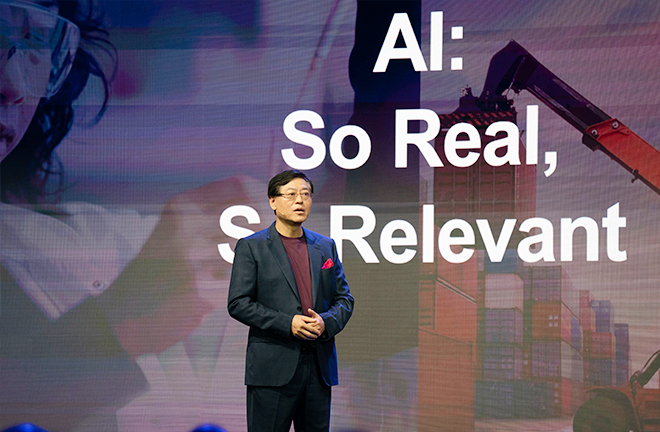Political security risks of AIGC

Lenovo Tech World 2023 was held on Oct. 24-25 in Austin, Texas, USA. Photo: Liu Guanguan/CNSphoto
AIGC (artificial intelligence generated content) is becoming an important means of producing online information content, undoubtedly enhancing social productivity. However, it is imperative that we carefully examine its diverse effects on society and take proactive measures to address the potential political security risks it poses.
Risk
The rapid advancement of AIGC technology has become a pivotal factor in the ongoing power struggles within the digital age, reshaping the international political and economic landscape. AIGC has the potential to instigate significant transformations in the global military arena. The capability of major powers to apply AIGC in military intelligence analysis, advanced weapon development, and war situation assessment will play a decisive role in the balance of military power.
The application of AIGC in the economic sphere could lead to the reorganization of the global economic order. Developed countries can leverage their advantages in underlying AIGC technologies to reinforce their monopolies on the global economy. Emerging economies may find themselves relegated to the lower rungs of the global industrial chain if they fail to gain the upper hand in this round of AIGC industry competition.
While the technology has no value orientation of its own, AIGC platforms are inevitably influenced by the power of sovereign states. This will become a key factor in the global promotion of specific AIGC platforms. “Black box” problems can be found in most current AIGC platforms in terms of training data selection and algorithm design, making those platforms vulnerable to ideological abuse.
As AIGC continuously advances, its application in social life will intensify. A massive volume of texts, images, and audio-visual content will be generated or optimized by means of AIGC. It can also assist governments and other public institutions in data analysis, decision-making and policy formulation. The productivity of numerous industries will be improved as a result.
However, the misuse of AIGC poses the risk of intelligence leaks. Sensitive information might be leaked when AIGC tools are used to process classified materials. When privacy policies are not enforced, AIGC platforms could conceivably collect users’ personal information in large amounts and derive from it critical information about various aspects of a country.
AIGC will generate considerable ripple effects beyond the digital sphere. Professions such as graphic design and video editing are likely to face disruption, with a large number of entry-level workers being displaced. The ensuing mass unemployment could increase social instability. Existing social distribution mechanisms will be affected as well. Industries that master AIGC technology may replace many other industries. Without sound policies and regulations put in place in advance, industrial structures will become severely imbalanced. This can give rise to excessive concentration of capital in certain industries, accompanied by widening wealth gaps and serious social inequality.
Governance
It is imperative to conduct an overall evaluation of AIGC’s political security risks at a national strategic level in order to effectively address them. It is advisable to invite experts and scholars in relevant fields to carry out comprehensive examinations of those risks to clarify their paths, modes of operation, and consequences. It is also necessary to closely follow the latest advances in AGIC technology worldwide, and establish specialized advisory and coordinating bodies at the national level. Early warning mechanisms and technical support platforms should be set up to track risks in real time.
While ordinary users are very enthusiastic about AIGC technology, public awareness of AIGC’s political security risks is extremely insufficient. It is therefore important to raise awareness through multiple national security education channels. The continuous development of AIGC technology provides a valuable opportunity for China to optimize its domestic industrial structure, enhance the role of science and technology in boosting the economy, and improve its position in the international industrial chain. It is essential to ensure both development and security in this process.
On the one hand, policy support can encourage domestic companies to innovate in AIGC technology and platforms with the goal of building a world-class AIGC industry. On the other hand, efforts should be made to accelerate the introduction of AGIC laws, regulations, and regulatory mechanisms to ensure the robust development of the industry within the framework of rule of law.
In addition, the development of AIGC technology and platforms should be placed under the supervision of the international community. This will allow AIGC to better contribute to international development without being used as a weapon in international power struggles.
Liang Huaixin is a lecturer in the School of International Relations at the University of International Business and Economics.
Edited by WANG YOURAN

 PRINT
PRINT CLOSE
CLOSE